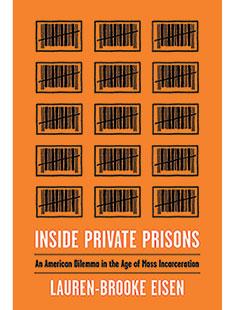Critics of private prisons, which house about 126,000 inmates nationwide, argue that these for-profit corporations are more concerned with their bottom line than staff training, inmate programming, or quality medical care, food, and accommodations. Supporters argue that these prisons are a much-needed solution to prison overcrowding and bring jobs to local economies. According to a new book by Lauren-Brooke “LB” Eisen ’97, Inside Private Prisons: An American Dilemma in the Age of Mass Incarceration, the biggest problem is that there’s not enough data to paint a complete picture. The private-prison industry is extremely opaque — claiming exception from public-record laws, thus providing little useful data and rarely granting access to facilities, so researchers have struggled to make meaningful recommendations.
“Without the ability to file open-records requests, the public cannot learn the most basic information about life inside these facilities,” she says.
One of Eisen’s first jobs after college was as reporter for the Laredo Morning Times in the border town of Laredo, Texas. She worked the criminal-justice beat, which brought her into contact with private immigration-detention centers and private prisons.
She then attended law school, becoming an assistant district attorney in New York City, and is now senior counsel at the Brennan Center’s Justice Program. For Inside Private Prisons, Eisen returned to Laredo to do research. The book explores the $5 billion private-prison industry, and what it means for society, elected officials, and inmates when profit motive is intertwined with incarceration. If private corporations are making money from housing incarcerated individuals, are the facilities less likely to rehabilitate their prisoners and reduce recidivism?
Again, the answer is unclear: Because of a lack of mandated accountability, says Eisen, private prisons are not required to measure their recidivism rate.
It’s also hard to tell whether private prisons are more cost-effective, as many claim to be, since they frequently negotiate contracts allowing them to restrict the types of inmates they will accept; some will reject elderly people and those with health conditions like HIV, thereby obscuring comparisons of their medical costs versus those of government facilities.
Eisen also addresses immigration-detention centers, 65 percent of which are privately owned, stating that they lack sufficient trauma and mental-health care for detainees. “When you walk around these facilities, they don’t look or feel any differently from a prison,” she says. “People are sitting idle all day.”
She says that several grassroots movements from within cities and universities (including Princeton) are advocating for divestment from private prisons.
“Momentum is building [in the divestment campaigns], but none of these schools and cities really have that much money in the private-prison industry,” she says. “I don’t think these campaigns have much potential to put corporations out of business.”
Eisen believes that reforming private-prison contracts could bring much-needed transparency to the industry and improve the quality of life for inmates.
“Given the reality that the for-profit prison industry is not disappearing tomorrow, it’s incredibly important to try to reform it,” she says. “[We must] change the incentives that reward more incarceration instead of rewarding better conditions, programming, and recidivism rates.”


